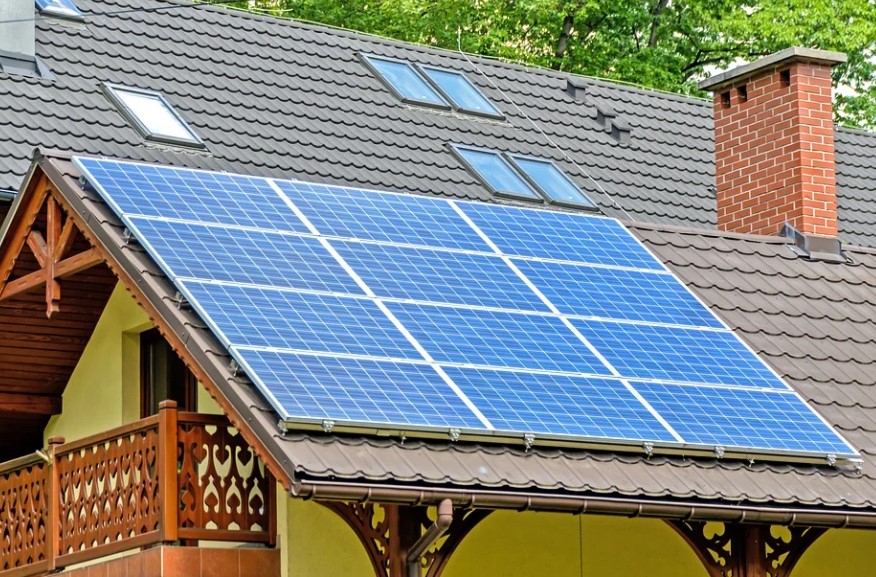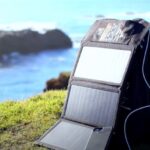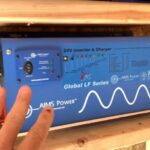Are you on the lookout for solar panels? We hear you. It is true that when you are vacationing and driving around in your RV, you can enjoy most of the comforts of home; however, with the number of items that need electricity to run, things may get a bit complicated. This is why today we’ll be telling you all about some of the best 100 Watt solar panel options available.
With the best 100-watt solar panel, you can enjoy an unlimited power supply available to use when you are not running the engine on your vehicle. Having the best 100-watt solar panels can obviously help you save a ton of money in the long run.
While it can be challenging to find the best 100-watt solar panel, especially if you are new to the green energy world, it is not impossible either. If you are searching for the best 100-watt solar panel, continue reading and get inspired by the options below.
Best 100 Watt Solar Panel FAQs
Is buying the Best 100 Watt Solar Panel worth it?
A 100-watt panel that receives 8 hours of sunlight per day will produce almost 1 kilowatt-hour per day. If we multiply this by 365 days per year, we get a solar output of about 365 kilowatt-hours annually. That means a 100-watt solar panel would be suitable to meet those needs.
What can I do with a 100Watt Solar Panel?
A single 100-Watt Solar Panel can power up several small devices, including cell phones, lamps, fans on ceilings, routers of wifi, laptops, and other small devices. Bigger appliances such as heaters, TVs, air conditioning systems, and others similar to these require more than one 100-Watt Solar Panel.
Can a 100-Watt Solar Panel run a refrigerator?
As a general rule, 100-watt solar panel can run a refrigerator for a short time only and would also need a battery. One hundred watts of solar panels can generate on average 400 watt-hours of energy per day. A refrigerator with a combined freezer needs 2000 watt-hours/day.
How many 100 watt solar panels does it take to run a house?
The number of solar panels you’ll install depends on how much electricity you want to generate and the available space for installation. An average single-family home typically installs around 20 panels.
How many batteries will a 100 Watt Solar Panel charge?
If you went for a setup with a 100 watts solar panel, you might still have some questions about the size of your battery bank. Solar Industry studies estimate that a 100-watt solar panel can produce up to 30 Ah of battery charge with a 5-9 hour timeline sun exposition.
How many amp-hours does a 100 Watt Solar Panel have?
A 100-watt panel produces an average of about six amps per peak sun hour or about 30 amp-hours per day. Given the above example, you would need three 100 watt solar panels to fully recharge on the average day (80 / 30 ≈ 3).
How long will a 100 Watt Solar Panel take to charge a 12v battery?
As a general rule, a typical size 12v 50Ah auto battery at 20% discharge will need 2 hours to recharge with a 100-watt solar panel fully. A lead-acid deep-cycle 12v 50Ah battery at 50% discharge will take about 4 hours to recharge using a 100-watt solar panel entirely.
How many watts will a 100 Watt Solar Panel produce?
A 100-watt solar panel will produce between 280-450W per day on average, depending on where you live. They can run small appliances such as fans, lights, and wifi routers. They are smaller than standard rooftop solar panels, typically between 250 and 450 W each.
What to keep in mind when choosing the Best 100 Watt Solar Panel?
Voltage (Vmp) and current (Imp) at Pmax
In an electrical system, the voltage is how much electrical power is used while the current flow quickly. Pmax is the sweet spot for solar panel power output. It is the combination of the maximum number of volts and amps that can be applied at one time, which will result in the highest number of possible watts of power being produced.
The reason that Pmax is something that you want to take into careful consideration is that it will directly affect how much power is being produced at one time.
Open-circuit voltage (Voc) and short-circuit current (ISC)
Open-circuit, or Voc, is how many volts of electricity a solar panel is able to put out with nothing connected to it. VOC is, obviously, a significant number, as it will help you determine the maximum voltage that the solar panel can produce under normal conditions.
Isc, or Short Circuit Current, on the other hand, is how many amps the solar panels can produce when they are not connected to a load but when the plus and minus wires are connected to each other. This will let you know how much current you have at your disposal and whether or not your electronics and appliances can handle it.
Dimensions
It would help decide how many panels you can fit on your vehicle. If you are, for instance, looking for the best 100-watt solar panel kit for van life, then you are obviously going to need something smaller since you don’t have as much room to set them up. Of course, if you have a bigger vehicle, like an RV, you will get a bigger model.
Weight
Solar panels can be put into two basic categories. You can either get portable panels or more permanent ones. Permanent models are a bit heavier, though they don’t weigh more than thirty pounds or so.
Extra Features
- One of the most important features of any solar panel is that it can be used with various batteries.
- Since these panels will be out in the elements, especially if you put them up permanently, it is best to look for a corrosion-resistant set.
- If you plan to go the portable panel route, you will want to make sure that you get a model with a handle.
How to install 100 Watt solar panels?
- Organize the space: The first thing comes first. Organize the space available for the solar power panel before beginning the installation process.
- Installing Mounting Brackets: Now, install the mounting brackets in the solar panels. Install them while the solar panels are still on the ground to save yourself from the additional labor before going to the surface.
- Installing Remaining Components: After you have your charge controller and battery set up in place, find the shortest path for the wires. The more the distance is, the more power loss and voltage drop will be.
- Drilling and Mounting: Start drilling a hole through your roof to pass the AWG wires. Install DC breakers in the charge controller before the wires reach it. Also, install fuses between the charge controller and the batteries.
- Install a water-resistant cable entry plate on the surface. Connect it to the series or a parallel connection compatible with the solar panels.
- Finally, you need to drill four mounting holes to secure the modules on the surface and install the panels in their predetermined positions. The mounting frame should have pre-drilled holes on it.
Solar Panel Maintenance
- To clean your panels, your first line of defense will be your garden hose. By spraying off your panels, you will remove most of the dust and dirt they will pick up on your travels.
- If they need more cleaning, you can use a soft sponge and some soapy water. Be sure to steer clear of anything too rough since this could scratch your panels.
- Aside from regular cleanings, you will also want to ensure that your panels do not suffer any corrosion or water damage.
- If water gets into the actual panels, they will not function properly. If this does occur, you will either need to replace your panels or have them fixed by an experienced technician.
Best 100 Watt Solar Panel
TISHI HERY 100W Portable Solar Panel
TISHI HERY 100W solar panel is made for most portable power stations on the market.
TISHI HERY solar panels are constructed of advanced high-purity monocrystalline solar cells which achieve 23% high efficiency.
Compared with conventional panels, TISHI HERY converts more sunlight into energy simultaneously and charges your devices at a faster speed.
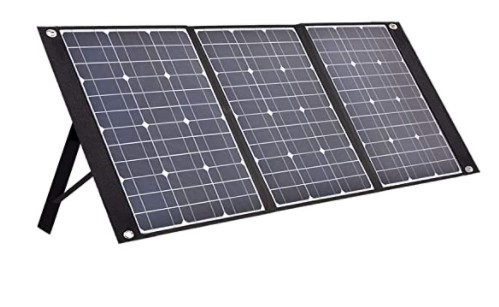
Features:
- Foldable
- 4 Outputs
- Monocrystalline Silicon
WindyNation 100 Watt Solar Panel
The Windy Nation 100 Watt Complete Solar Charging Kit allows you to start producing free, clean power from the sun. Perfect for RV’s, boats, cabins, and backup power.
WindyNation’s 100 Watt Solar Kit includes what you need to get started: (1pc) 100 Watt Solar Panel, User Adjustable LCD 30-Amp Solar Charge Controller with Battery Temperature Sensor, 40 ft of UL Listed 12 AWG Solar Cable, all necessary Connectors for wiring, and all the required mounting hardware (4 Solar Panel Mounting Brackets and Fastener Sets).
Panel Connectors are essential and play a key role, which is why we also dig into all the different Solar Panel Connectors Types, take a look!
This Kit includes our premium grade PWM solar charge controller with a digital display. The digital display provides detailed system information, including solar panel charging amperage, battery voltage, battery temperature, load draw (if a load is connected), solar generated amp-hours to the battery, etc.
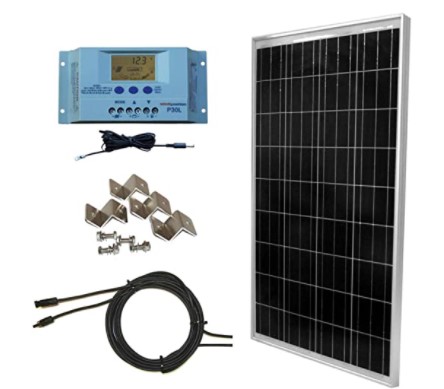
Features:
- Off-Grid
- PWM Charge Controller
- Solar Cable
SunPower Flexible 100 Watt Monocrystalline Solar Panel
Made with SunPower’s highest-efficiency Maxeon solar cells, our portable solar panels deliver the most power and highest charging capacity in their product class.
We manufacture each panel using a top-grade, lightweight polymer material, allowing easy transport, installation, and flexibility up to 30 degrees.
Each panel comes with MC4 male and female connectors that can connect easily to solar compatible devices. Connection cables are device-specific and sold separately.
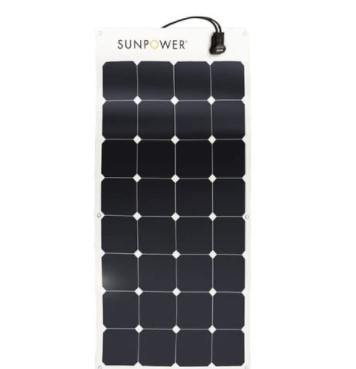
Features:
- Weather Resistant
- Flexible
- Powerful
HQST 100 Watt 12 Volt Polycrystalline Solar Panel
Pre-drilled holes on the back of the panel allow for fast mounting and securing. Compatible with different mounting systems such as Z-brackets, Pole Mounts, and Tilt Mounts.
High module conversion efficiency. Ideal output: 500Wh per day (depending on the availability of sunlight). Bypass diodes minimize power drop caused by shade and ensure excellent performance in low-light environments.
Advanced encapsulation material with multilayered sheet laminations enhances cell performance and provides a long service life.
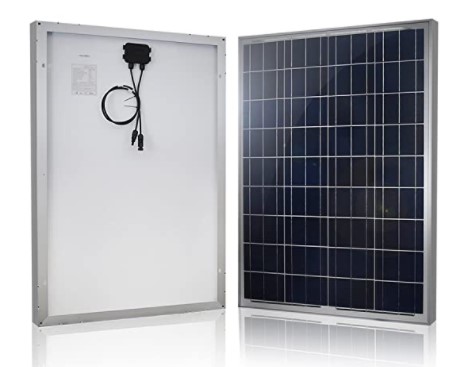
Features:
- Corrosion-Resistant
- Off-Grid Applications
- Polycrystalline
Renogy 12 Volt Solar Panel 100 Watt
Bypass diodes protect the solar cells from overheating and allow the solar panel to continue working during accidental shading by bypassing the underperforming cells.
This Renogy 100W 12V Monocrystalline Panel is made from high purity silicon cells coated with advanced encapsulation material with multilayered sheet laminations to enhance cell performance and provide long-lasting durability.
Corrosion-resistant aluminum frame provides extended outdoor use, ensuring the panel can last for decades.
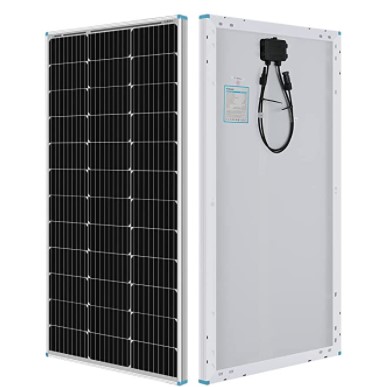
Features:
- Monocrystalline Silicon
- Corrosion-Resistant
- Easy Installation
Looking for a portable solar panel to take with you when you are hacking? TheInstapark 10 Watt Solar Panel is a great option; you can check the Best Solar Panel for Backpacking that best suits your needs.

